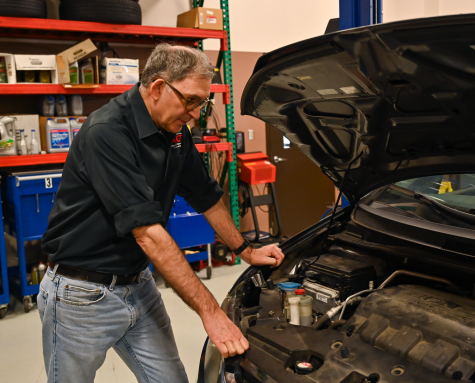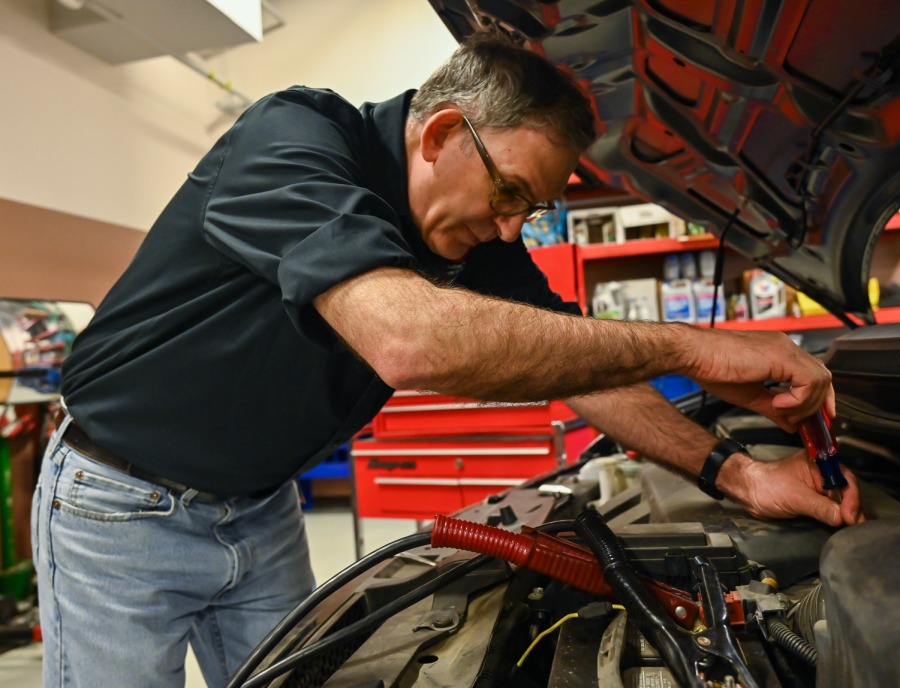Shifting into gear: Lamborghini takes charge, drives automotive career forward
Peter Lamborghini works on the engine of a van inside the garage of the T building on Nov. 29.
December 6, 2022
Peter Lamborghini, Honda PACT coordinator and automotive mechanic at Eastfield, is certified to work on just about any car. Sharing his name with a popular luxury sports car makes his career choice seem like fate despite starting off in a different field. Lamborghini sat down with Et Cetera staff writer Blake Dickerson to talk about his experience working to become a technician in the automotive field.
Q: I can’t but help but to ask about your last name. After some research, I learned that you have worked on Lamborghinis. Is there a correlation between the two?
It’s a cool last name. I was trained as a scientist and people would say to me, “You’re in the wrong business.” And you can’t argue with that. It’s a great car name, and eventually I decided I wasn’t going to stay in the science field. Then I asked myself “what do I like?” That was cars. With a last name like this, I gotta explore what that’s like.
Q: So how did you get experience applying for a job like being a Lamborghini technician?
Well, I grew up in New England. It’s a conservative area, and people don’t want to take risks. It’s one of those “Catch-22s” where we won’t hire you if you don’t have experience. So I had to leave New England to get hired as a Lamborghini technician. I found a place that allowed me to start out and got hired by a guy in Iowa who was the technical trainer for Lamborghini in the American dealership network. He relocated to Dallas and that’s what got me to Dallas. So I worked in an independent shop that was doing Lamborghinis and gained experience that way.
Q: Were Lamborghinis your first real experience with cars or did you gain experience working on other cars first?
I worked on my own cars. My first car was a used MG (former British car maker), and I just learned how to fix it myself. You learn and make mistakes and do it on your own car. My first job getting paid as a mechanic was with BMW. That was an independent shop, and I was the kid in the shop. I would get the parts, the coffee and sweep the floors. Eventually, I would start doing oil changes and tune-ups. Then when I came to Texas to do the Lamborghini work, which was very exciting, I still didn’t know much about cars and I was the kid in the shop again. When that job ended, I felt I needed more technical knowledge. I went to work at a Honda dealership, and Honda has excellent training for their technicians. They send you to a training center a week at a time. Almost everything I learned about cars came from that center.
Q: Honda has been rated one of the most reliable car companies, so is there different training they put you through compared to other car companies?
I think that all Japanese car companies have a high regard for quality when they build and engineer the cars. They then ask their owners to do maintenance on their cars, which is something a lot of American car owners and dealerships don’t really emphasize. Pretty much all Japanese cars are reliable and very cheap to own. They get very good gas mileage and are very economical.
Q: Considering that most companies are going fully electric soon, how do you think that will impact consumers?
We’re getting more alternative cars from the dealerships. We can buy hybrid cars. There’s a hydrogen- powered car that you can lease in Los Angeles and in Miami. There’s more ways to run a car than a gasoline-powered engine, and nobody knows what the future holds. We will see what people are driving in 20 years and see how people are building them and how consumers will buy them.
Q: What kinds of certifications do you have and how have you obtained them?
Some of my certifications are from Honda. If you pass the training, you get certified. That’s how I learned most of my technical knowledge, through the Honda training center and working on the cars at the dealership for many years. Outside of the manufacturers, the only body that

Peter Lamborghini works in the Career Technologies program at Eastfield.
certifies the industry is called the ASE (Automotive Service Excellence), and you take a test. It’s sort of like the SAT to test out of college. You take a test and if you pass the test you can be certified in a subject area like engines, brakes or transmissions. There are eight general tests for entry level. The more certifications you have, the more valuable you are in the industry.
Q: What was the hardest part of getting these certifications?
Automatic transmissions gave me the most trouble. I had to take that test five times to pass, and I could rebuild automatic transmissions at the Honda dealership. After studying how American transmissions work, I finally passed that test. Sometimes it does take a while to get all your certifications.
Q: This is a question everyone loves to ask mechanics: What is your dream car that you would love to own one day?
I would love to have an older Lamborghini. It’s just because the V-12 engines sound so amazing. Also, my name is on the car.





